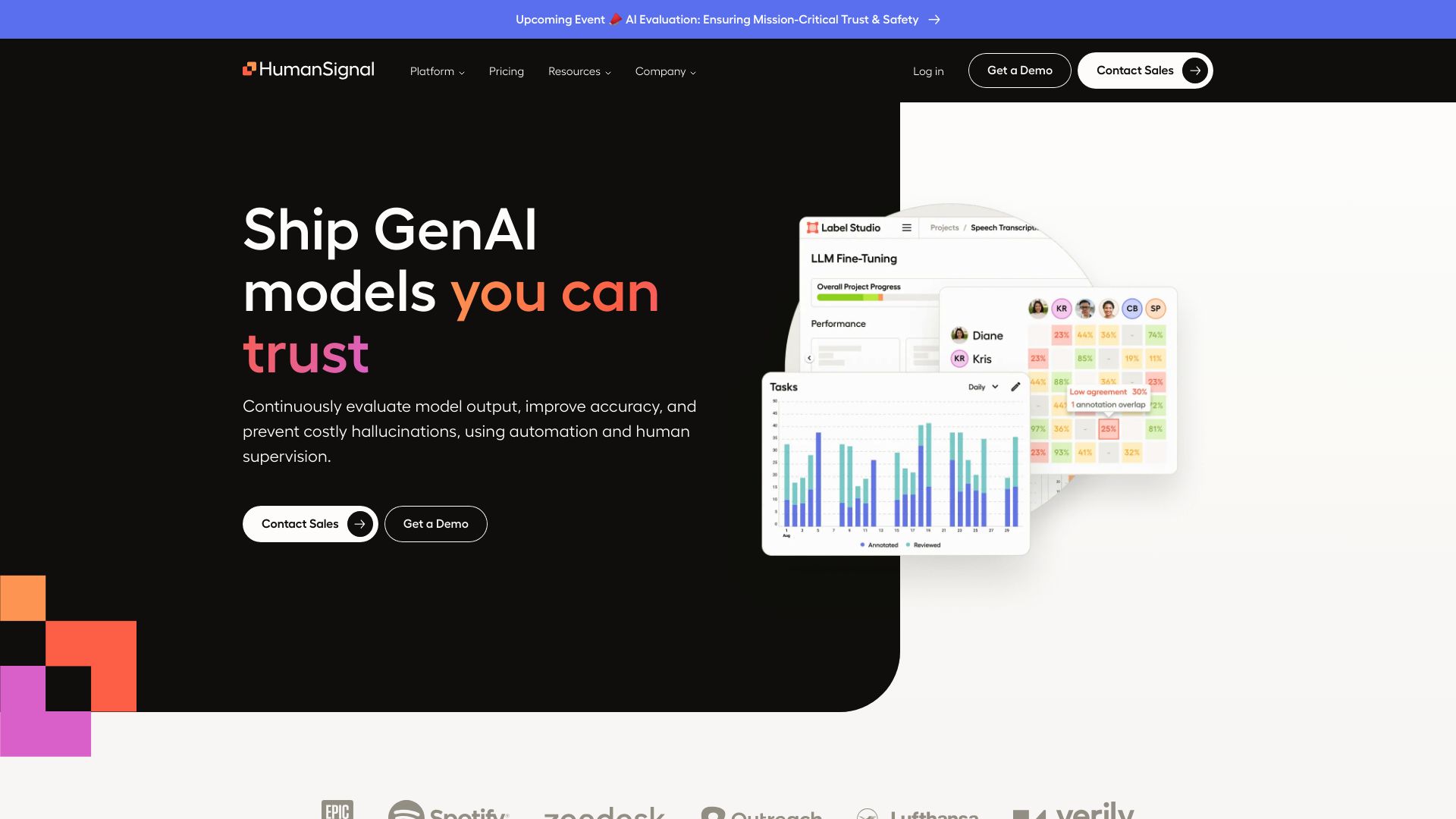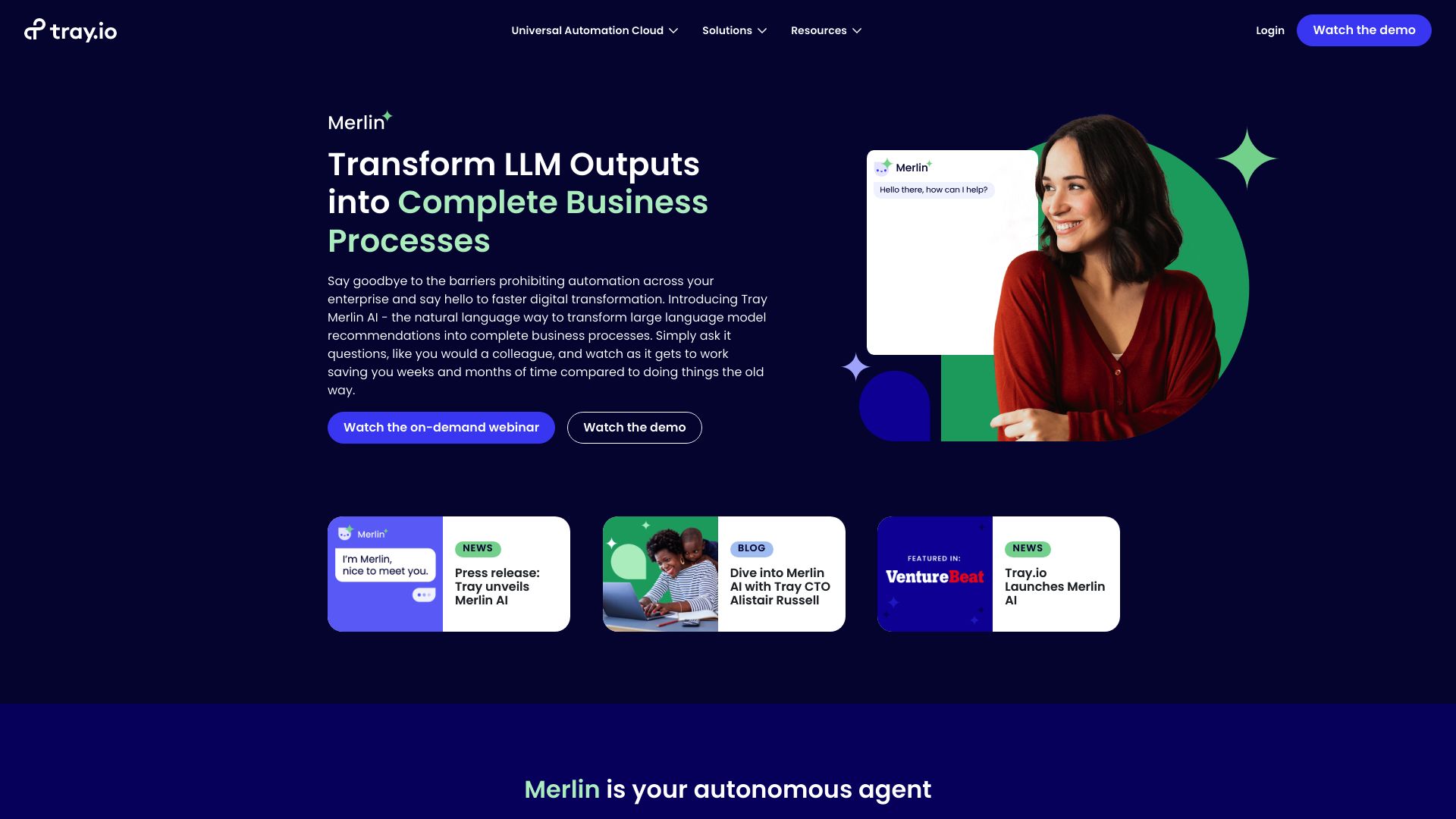Adala vs. Tray Merlin AI: Comparing AI Agent Platforms
AI agent development platforms are reshaping how businesses automate processes and handle data. Adala vs. Tray Merlin AI offer distinct approaches, each with unique strengths in data labeling and workflow automation. This comparison explores their key features, capabilities, and limitations.
We’ll also introduce SmythOS, a comprehensive platform that combines powerful AI tools with user-friendly interfaces. Whether you’re a developer seeking robust APIs, a business leader looking for scalable solutions, or a non-technical user in need of accessible AI tools, this guide will help you navigate the evolving landscape of AI agent platforms and choose the solution that best fits your needs.
Adala Overview
Adala revolutionizes data labeling with its open-source framework for building autonomous AI agents. Designed for developers and data scientists, Adala empowers users to create specialized agents that continuously improve through interactions with data and human feedback.
Adala revolutionizes data labeling with its open-source framework for building autonomous AI agents… that continuously improve through interactions with data and human feedback.


Adala’s core strength lies in its use of large language models like GPT-3 as the runtime for executing skills and tasks. This foundation enables agents to acquire specialized abilities such as text classification, summarization, and question answering. The platform’s modular architecture encourages extensibility, allowing users to create custom skills tailored to their specific data labeling needs.
A key feature of Adala is its learning process. Agents train on labeled ground truth datasets provided by users, ensuring targeted skill development. The framework incorporates a tight feedback loop where agents can request human input on their predictions, fostering reliability and continuous improvement. This human-in-the-loop approach strikes a balance between automation and quality control, crucial for maintaining high standards in data labeling tasks.
Adala… incorporates a tight feedback loop where agents can request human input on their predictions, fostering reliability and continuous improvement.
While Adala offers powerful capabilities for autonomous data labeling, it may present a steeper learning curve for non-technical users. The platform primarily caters to those comfortable with code and APIs, lacking a visual builder or no-code editor. However, for developers and data teams seeking to enhance their labeling workflows, Adala provides a robust foundation for creating efficient, adaptable, and intelligent labeling solutions.
Tray Merlin AI Overview
Tray Merlin AI transforms large language model outputs into complete business processes, providing automation capabilities through a natural language interface. This innovative platform enables users to create, manage, and deploy AI-powered workflows with minimal coding requirements.


Tray Merlin AI stands out with its natural language automation feature, allowing users to initiate complex processes through conversational inputs. The platform acts as an autonomous agent, bridging the gap between large language models and actionable business automations. This approach empowers business technologists, managers, and developers to rapidly build and iterate enterprise processes.
Tray Merlin AI transforms large language model outputs into complete business processes, providing automation capabilities through a natural language interface.
Unlike many AI platforms, Tray Merlin AI operates within the secure Tray ecosystem, ensuring data privacy by not exposing information to external language models. The platform boasts extensive integration capabilities, offering 600+ out-of-the-box connectors with standardized schemas for seamless system integration.
Tray Merlin AI excels in providing instant answers at the point of decision, enabling users to access specific data and insights quickly. The platform supports the creation of repeatable automations with advanced business logic, allowing for complex workflow automation and regular report generation without manual intervention.
While Tray Merlin AI offers powerful capabilities, users should consider potential limitations. The platform’s effectiveness may depend on the quality and specificity of natural language inputs. Additionally, the learning curve for optimizing complex workflows could be steep for non-technical users, despite the low-code interface.
Feature Comparison
Adala and Tray Merlin AI offer distinct approaches to AI agent development, each with unique strengths and limitations. Adala provides an open-source framework for building autonomous data labeling agents, leveraging large language models as its core runtime. Its modular architecture allows for extensible skill development and incorporates human feedback for continuous improvement. Tray Merlin AI, on the other hand, focuses on transforming language model outputs into complete business processes through a natural language interface.
Key feature gaps emerge in core components and security. Adala lacks a visual builder and no-code editor, requiring users to interact through code and APIs. This limitation may present challenges for non-technical users seeking to create AI agents. Tray Merlin AI addresses this gap with its low-code interface, enabling rapid workflow creation and iteration. In terms of security, Adala does not explicitly mention data encryption or OAuth implementation, potentially raising concerns for enterprise-level deployments. Tray Merlin AI operates within the secure Tray ecosystem, ensuring data privacy by not exposing information to external language models.
SmythOS stands out by offering a comprehensive suite of features that bridges these gaps. Its visual builder and no-code options cater to users across technical skill levels, while robust security measures, including data encryption and OAuth support, address enterprise concerns. SmythOS also provides multimodal capabilities and a wider range of deployment options, offering greater flexibility and scalability compared to both Adala and Tray Merlin AI.
| Adala | Tray Merlin AI | SmythOS | |
|---|---|---|---|
| CORE FEATURES | |||
| Hosted Agents (Dev, Production) | ❌ | ✅ | ✅ |
| Visual Builder | ❌ | ✅ | ✅ |
| No-Code Options | ❌ | ✅ | ✅ |
| Debug Tools | ❌ | ✅ | ✅ |
| Multimodal | ❌ | ❌ | ✅ |
| Multi-Agent Collaboration | ❌ | ✅ | ✅ |
| Audit Logs for Analytics | ❌ | ✅ | ✅ |
| SECURITY | |||
| Data Encryption | ❌ | ✅ | ✅ |
| OAuth | ❌ | ✅ | ✅ |
| IP Control | ❌ | ✅ | ✅ |
| COMPONENTS | |||
| Huggingface AIs | ❌ | ❌ | ✅ |
| Zapier APIs | ❌ | ❌ | ✅ |
| All other APIs, RPA | ❌ | ✅ | ✅ |
| Data Lakes | ❌ | ❌ | ✅ |
| DEPLOYMENT OPTIONS (EMBODIMENTS) | |||
| Deploy as Webhook | ❌ | ✅ | ✅ |
| Staging Domains | ❌ | ✅ | ✅ |
| Production Domains | ❌ | ✅ | ✅ |
| API Authentication (OAuth + Key) | ❌ | ✅ | ✅ |
| Deploy as Site Chat | ❌ | ❌ | ✅ |
| Deploy as Scheduled Agent | ❌ | ✅ | ✅ |
| DATA LAKE SUPPORT | |||
| Hosted Vector Database | ✅ | ❌ | ✅ |
| Sitemap Crawler | ❌ | ❌ | ✅ |
| YouTube Transcript Crawler | ❌ | ✅ | |
| URL Crawler | ❌ | ❌ | ✅ |
| PDF Support | ❌ | ✅ | ✅ |
| Word File Support | ❌ | ✅ | ✅ |
| TXT File Support | ❌ | ✅ | ✅ |
Best Alternative to Adala and Tray Merlin AI
SmythOS emerges as the superior choice for AI agent development, offering a comprehensive platform that outshines both Adala and Tray Merlin AI. Our all-in-one solution caters to users across technical skill levels, from developers to business professionals.
We provide an intuitive visual builder and no-code options, empowering users to create sophisticated AI agents without extensive programming knowledge. This accessibility sets us apart from Adala’s code-centric approach and surpasses Tray Merlin AI’s low-code interface.
SmythOS emerges as the superior choice for AI agent development, offering a comprehensive platform that outshines both Adala and Tray Merlin AI.
Security stands at the forefront of our design. SmythOS implements robust measures including data encryption and OAuth support, addressing enterprise-level concerns that Adala overlooks. While Tray Merlin AI offers security within its ecosystem, our platform provides greater flexibility without compromising data protection.
Our multimodal capabilities expand the horizons of AI agent functionality. SmythOS supports various input and output types, including text, voice, and images—a feature notably absent in both Adala and Tray Merlin AI. This versatility allows for the creation of more sophisticated and adaptable AI solutions across diverse use cases.
SmythOS also shines in deployment options and scalability. We offer a wide range of deployment methods, from APIs and webhooks to site chats and scheduled agents. This flexibility, combined with our platform’s inherent scalability, ensures that AI solutions grow seamlessly with your business needs. Whether you’re a startup or an enterprise, SmythOS provides the tools and infrastructure to support your AI initiatives at any scale.
Conclusion
Adala and Tray Merlin AI offer unique approaches to AI-driven automation, each with distinct strengths. Adala’s open-source framework excels in building specialized data labeling agents, while Tray Merlin AI focuses on natural language-driven business process automation. Both platforms demonstrate the potential of AI in streamlining workflows and enhancing productivity.
SmythOS, however, emerges as the superior choice, combining the strengths of both platforms while addressing their limitations. Our comprehensive suite of features includes a visual builder and no-code options, catering to users across technical skill levels. We prioritize security with robust measures like data encryption and OAuth support, making SmythOS ideal for enterprise-level deployments. Our platform’s multimodal capabilities and diverse deployment options offer unparalleled flexibility and scalability.
For those seeking a powerful, versatile, and user-friendly AI platform, we invite you to explore SmythOS. Create a free account to experience firsthand how our platform can transform your AI development process. Whether you’re a developer, business leader, or AI enthusiast, SmythOS provides the tools and capabilities to bring your AI projects to life efficiently and effectively.
Last updated:
Disclaimer: The information presented in this article is for general informational purposes only and is provided as is. While we strive to keep the content up-to-date and accurate, we make no representations or warranties of any kind, express or implied, about the completeness, accuracy, reliability, suitability, or availability of the information contained in this article.
Any reliance you place on such information is strictly at your own risk. We reserve the right to make additions, deletions, or modifications to the contents of this article at any time without prior notice.
In no event will we be liable for any loss or damage including without limitation, indirect or consequential loss or damage, or any loss or damage whatsoever arising from loss of data, profits, or any other loss not specified herein arising out of, or in connection with, the use of this article.
Despite our best efforts, this article may contain oversights, errors, or omissions. If you notice any inaccuracies or have concerns about the content, please report them through our content feedback form. Your input helps us maintain the quality and reliability of our information.
